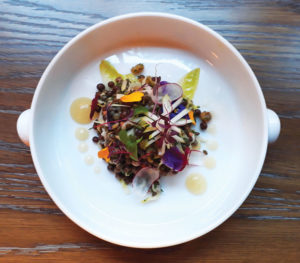 INTERNATIONAL REPORT—Hotel chefs are stepping up to the plate to expand their menu offerings with healthy, plant-based options—from lush salads topped with heirloom vegetables to exotic grains to homemade pastas and sauces—specifically designed to satiate and tantalize the palates of vegans and health-conscious travelers alike.
INTERNATIONAL REPORT—Hotel chefs are stepping up to the plate to expand their menu offerings with healthy, plant-based options—from lush salads topped with heirloom vegetables to exotic grains to homemade pastas and sauces—specifically designed to satiate and tantalize the palates of vegans and health-conscious travelers alike.
By definition, a vegan is a person who doesn’t consume or use animal products, but it’s much more than that. While a change in eating habits is part of the equation, it’s also a way of life for many people who choose this path.
Veganism has been trending due in part to documentaries such as What the Health and Forks Over Knives, as well as celebrities like Oprah Winfrey, Joaquin Phoenix, Beyonce and Jay-Z who have “gone vegan,” raising the profile of the lifestyle for the mainstream public. Medical professionals are also shining a light on the power of plant consumption to treat chronic diseases such as diabetes, heart disease, obesity and cancer. In addition, animal rights advocates have argued that producing meat on an industrial scale is posing detrimental health and environmental costs.
A healthy vegan meal is plant-based and consists of any of the following: fruits, vegetables, potatoes, whole grains and legumes. And, with awarenesss of this trend comes understanding and the responsibility to cater to the demands of all consumers. Hotel Business reached out to three hotels—Baccarat Hotel & Residences New York, The Beverly Hills Hotel and London’s Flemings Mayfair Hotel—whose intrepid chefs are creatively injecting new life into their menus with nutritious, taste-bud-pleasing recipes where plants take center stage.
“We’ve seen an increasing interest in veganism in recent years. Sadly, I feel that vegans are often neglected when dining out due to the lack of any options on the menu. Here, at Flemings Mayfair, we care about our guests and cater to all their needs. This is why creating this vegan menu felt like a natural thing to do,” said Shaun Rankin, a British chef, Michelin-starred restaurateur and television personality. He also runs Ormer Mayfair at the Flemings Mayfair Hotel.
A focus on sustainability issues and the needs of customers spurred The Beverly Hills Hotel Executive Chef Kaleo Adams to introduce a plant-based menu.
“Many of our guests are also passionate about the environment and its natural resources, and we want them to be able to stick to their preferred eating habits when traveling,” Adams said. “Most importantly, we’re not here to tell people what they should eat; instead, we provide quality options that benefit diners as well as Mother Earth. In terms of why we approach food the way we do, it’s because we care about how animals are raised, the health of our guests, and best meeting the individual demands of consumers.”
The Baccarat Hotel & Residences New York serves a vegan afternoon tea service, advance reservations required, to guests. The hotel’s Tea Sommelier Gabrielle Jammal introduced the vegan offering to fill an unmet void and build upon its upscale offerings.
“I decided to introduce this because I don’t think there are enough vegan options for afternoon tea. We have many guests who are vegan, and I wanted to offer them a special tea menu that meets their dietary needs and is also a quality culinary experience,” said Jammal.
While their culinary tastes and backgrounds may differ, there is a commonality among these chefs—a passion for food and desire for broader horizons to deliver an unmatched dining experience through the senses to guests.
“I haven’t received training on vegan cooking, but I am a curious culinarian by nature and became interested in learning about plant-based foods in much the same way I would study Japanese or Thai cuisine,” said Adams, a Hawaiian native. “What has helped me increase my knowledge are the frequent interactions I have with our guests, who are eager to share more about their vegan lifestyles. In fact, many of our core vegan recipes have been influenced by what I have learned from guests, and we continue to add and enhance our offerings each month.”
A vegetarian and self-professed animal lover, Jammal credits her longtime career in hospitality and research with the hotel’s culinary team with enabling her the ability to determine the best menu items to showcase.
For his part, Rankin acknowledged his passion for fresh ingredients as the impetus for a vegan menu. “I have been foraging for over 10 years by the shoreline and woodland areas of the beautiful island of Jersey. The expertise that I developed and my love for fresh ingredients is the driving force behind my vegan menu,” said Rankin.
Vegans and adopters of a plant-based diet are often asked, “Where do you get your protein?” According to dieticians, vegetables, whole grains and legumes are great sources of protein.
“We don’t use meat substitutes, as protein is pretty much found in all non-processed foods. If you eat pure and healthy foods, you will get all the protein you need,” said Jammal. “I think the media has hyped up the need for excessive proteins in one’s diet, and consumers have become a bit too obsessed with this. Most people, depending on body type and lifestyle, don’t need more protein than healthy, well-balanced diets provide them with.”
For Adams, it depends on what guests are currently allowing in their diets. “Some enjoy having these options, while others feel they are filled with processed substitutes that mimic the chew and taste of real meat. But providing great service is all about meeting the specific needs of everyone, and this is what we do on a daily basis,” he said.
Rankin prides himself on bringing forth nutrient-packed ingredients, adding, “I always do my best to incorporate superfoods on our menu in order to deliver varied and nutritious options. My shoreline-foraged vegetables, like salty fingers for example, are packed with vitamins and minerals.”
For these chefs, culinary inspiration comes in many forms, whether it’s collaboration, research or travel. “I work very closely with our chefs at the hotel, and this collaborative relationship enables us to create innovative offerings,” said Jammal.
“I enjoy looking at vegan blogs, but typically avoid anything that is ‘this way or no way.’ This is probably the easiest way to stay relevant with vegan offerings,” said Adams. “What’s most interesting to me are ways to get protein into one’s diet without using animal products. With more products coming to market all the time, it gets easier to do this and provide inventive options for the most fickle guests.”
Rankin added, “My inspiration comes from all over the world. I look further afield to other countries and religions where meat and fish proteins are either not available or accepted.”
For hoteliers and chefs considering expanding their menu to provide vegan options, Rankin enthused, “Go for it and shout about it. The vegan community will love you for it and will feel as much at home in your restaurant as every other diner.”
Jammal agreed, adding vegan menus can open new avenues. “Do it! Vegan options not only have the potential to bring in new clients, they also help people make healthier and more responsible food choices. This is how we can change the world one meal at a time.”
Adams advises chefs to “listen to your guests. Have an open mind and dine at other vegan restaurants. Be innovative, and don’t just offer pasta or risotto. Educate the front-of-house staff so they know how something on your existing menu can be altered to provide a vegan guest with a meal that is delicious and fulfilling to them.” HB

